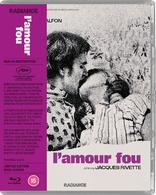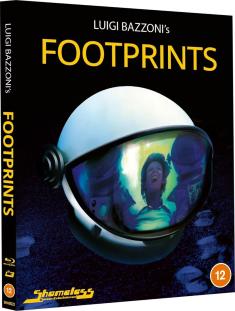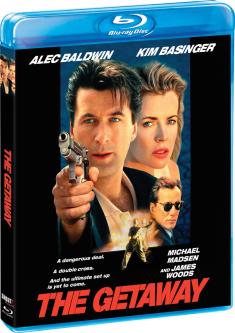Mr. Deeds Goes to Town: 80th Anniversary Edition
Overview -
When small-town innocent Longfellow Deeds (Gary Cooper) heads to New York to collect a $20 million inheritance, he ends up a target of ridicule thanks to Babe Bennett (Jean Arthur), a cynical reporter whose demeaning stories have made him the joke of the city. So when he discovers his sweet and unassuming new girlfriend is actually the hardboiled Bennett in disguise, a disillusioned Deeds decides to give his fortune away, an act of charity his crooked lawyer will stop at nothing to prevent.
Winner of the 1936 Academy Award for Best Director and now fully restored in 4K, Frank Capra's Mr. Deeds Goes to Town is the quintessential screwball comedy, an irresistible blend of laughter, wit and romance.
Storyline: Our Reviewer's Take
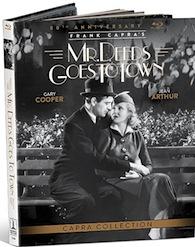
Frank Capra may have directed the world's first romantic comedy, but he's best known for uplifting and meaningful social commentary films that are so virtuous and earnest many have been dubbed "Capra Corn." 'Mr. Deeds Goes to Town,' the first Capra movie with an agenda, is Exhibit A, but its inherent sentimentality and righteousness don't diminish its impeccable quality, lasting impact, or inherent worth. Capra spent much of his career championing the American everyman and passionately chronicling his noble struggles against a stuffy, dismissive, and often corrupt establishment, but by peppering his stories with whimsical comedy and sweet romance he broadened their appeal and made the messages more palatable. 'Mr. Deeds Goes to Town' minted the formula and paved the way for other relevant Capra classics like 'You Can't Take It With You,' 'Mr. Smith Goes to Washington,' 'Meet John Doe,' 'It's a Wonderful Life,' and 'State of the Union.'
Produced at the height of the Depression in 1936, 'Mr. Deeds Goes to Town' connected on a visceral level with downtrodden audiences by celebrating an identifiable, honest-to-a-fault guy who decides to stand up and fight for his brethren. This hopeful film spoke to a hopeless population and buoyed their spirits by assuring them - despite appearances to the contrary - they weren't forgotten. And though the economy is far better today, this classic may well have the same effect on contemporary viewers who feel disenfranchised, left behind, and undervalued. At the ripe old age of 80, 'Mr. Deeds Goes to Town' looks a bit dated, but its core themes are timeless, and its masterful presentation still hits home.
Like many Americans, Longfellow Deeds (Gary Cooper) is an unassuming fellow who lives a happy enough existence in a small, rural town. He writes poetry for greeting cards, plays the tuba in the town band, and fantasizes about saving a "lady in distress." But Deeds' simple world is turned upside down when a city slicker lawyer turns up one day to inform him his (very) rich, recently deceased uncle has bequeathed him the ungodly sum of $20 million! Deeds accepts the news without batting an eye, and when he's told he must go immediately to New York to manage the estate, he seems more concerned about finding a replacement tuba player than how his sheltered life is destined to change.
And change it does. Before he can catch his breath, he's deposited in an ornate Manhattan mansion, showered with servants, and thrust into an unfamiliar social and civic sphere. Deeds transitions surprisingly well, but his nonplussed attitude, country-bumpkin persona, and wide-eyed naïveté lead his lawyers to believe he's a dope, and they insidiously conspire to obtain power of attorney so they can embezzle his inheritance. Deeds, however, proves to be smarter than they realize, and his plain speaking, homespun values and ability to recognize and revoke fools, sycophants, opportunists, and uppity sophisticates who ridicule and disdain him make him immune to manipulation.
Except when he encounters his long-elusive damsel in distress. Mary Dawson (Jean Arthur) faints from hunger and fatigue on a rainy sidewalk right in front of Deeds, and he instantly comes to her rescue. Yet the collapse is all an act. Unbeknownst to Deeds, Mary is really Babe Bennett, a hard-nosed newspaper reporter determined to land the scoop of the century, and thanks to Deeds' carefree antics and uninhibited attitude, she exploits him to a fare-thee-well, dubbing him "Cinderella Man" and painting him as a buffoon in a series of sensational articles. But while she's lampooning him, the oblivious Deeds is falling in love, and so is the guilt-ridden Babe, who comes to loathe dragging the sincere, forthright Deeds through the mud. Of course, just as she's about to confess her sins, Deeds learns of her deception, and that, coupled with a face-to-face confrontation with an angry indigent who rebukes Deeds for not using his fortune to help those in need, opens his eyes and caps off his all-consuming disillusionment and disgust with money and the elite.
Deeds then makes an impulsive, altruistic decision that rocks the foundation of New York society, and the dramatic fallout affects Deeds, Babe, and all the vultures conspiring to bring him down.
In his autobiography, Capra wrote, "Beginning with 'Mr. Deeds Goes to Town,' my films had to say something." And say something 'Mr. Deeds' did. A classic city values vs. country values yarn, the picture strikingly pits the haves against the have-nots in an ideological war that Capra would wage across many films. The brilliant, Oscar-nominated script by Robert Riskin paints a cynical portrait of a greedy, arrogant establishment obsessed with materialism, manipulating the system, and scamming the innocent. And who should combat its ugly slings and arrows but the awkward, bumbling Deeds, an unabashed champion of the little guy who leads by example and refuses to be helped or pampered. Honest, caring, and humble, he's the archetypal common man and an unimpeachable role model. He may seem dim-witted, goofy, and gullible, but he's far more savvy than he looks, and his quiet introspection, steadfast moral center, and ability to tell it like it is in a few choice, forceful words make him an admirable figure and formidable adversary. A true populist with an optimistic message, he says what others feel, and after watching this movie, it's hard not to wish Longfellow Deeds was running for POTUS this year instead of the current, doom-and-gloom, pseudo-populist Republican nominee who cares about no one and nothing but himself.
Deeds proved to be a defining role for Cooper. Not only did it earn him his first Best Actor Oscar nomination, but more importantly, the character's naïve, aw-shucks charm would become part of his professional persona for the remainder of his career. In his autobiography, Capra wrote Cooper was the only actor in Hollywood who could play Deeds. "Every line in his face spelled honesty. So innate was his integrity he could be cast in phony parts, but never look phony himself." Cooper's unassuming naturalness and almost monotonic line deliveries have led some to question his talent (despite two Best Actor Oscars), but he's practically perfect as Deeds. In a world of excess, his understatement keeps Deeds grounded and relatable, and his simple sincerity touches our hearts.
The same can be said of Arthur, which may explain why they make such a winning pair. In a breakout portrayal, Arthur deftly juggles her character's duplicity, but always keeps us on her side. Babe has no axe to grind; she's just a struggling working girl doing what she can to get ahead in a tough business, and it's a tribute to Arthur that we always know that. Though she reportedly suffered from horrible stage fright ("I'm sure she vomited before and after every scene," Capra wrote. "When the cameras stopped, she'd run headlong to her dressing room, lock herself in - and cry."), her performances almost always seem effortless, and her work in 'Mr. Deeds Goes to Town' is both charismatic and irresistible.
A top-notch supporting cast also punches up the production, but it's Capra's ability to seamlessly blend comedy, drama, and romance within a social message context that really distinguishes 'Mr. Deeds Goes to Town' and makes it a groundbreaking film. Capra's genius for making us laugh, cry, and think all at the same time is something other directors have tried to copy over the years, but never quite mastered, and it's one reason why Capra received his second Best Director Academy Award for the movie. ('Mr. Deeds Goes to Town' also was nominated for Best Picture, and though it lost the Oscar, it won the citation from the New York FIlm Critics Circle and National Board of Review.)
Back in 1936, 'Mr. Deeds Goes to Town' preached a hopeful sermon, telling people they could overcome the constraints of their environment, stand up against the bullies trying to take advantage of them, and both reclaim their self-respect and do something good for their fellow man. Courage and smarts are required, but if a nobody like Longfellow Deeds could do it, they could, too. That message hasn't changed, and thanks to the film's warmth, wit, excellent performances, and keen sense of purpose, it resonates just as strongly today. Maybe even stronger. And if that's Capra Corn, then I'll take a heaping helping of it.
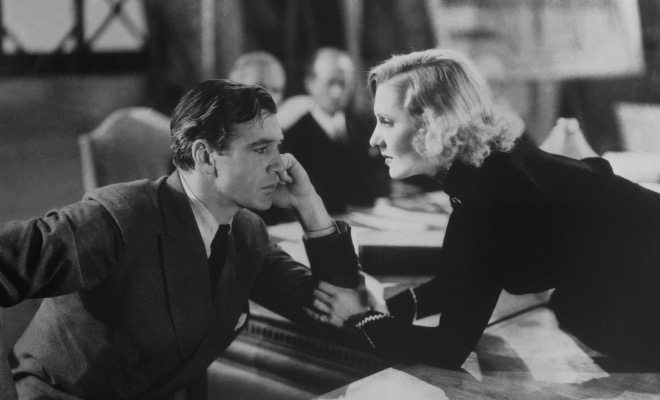
The Blu-ray: Vital Disc Stats
'Mr. Deeds Goes to Town' arrives on Blu-ray packaged in a handsome, artistically designed digibook with 26 glossy pages of text, photos, and color reproductions of vintage promotional materials. An essay by Jeremy Arnold, key credit lists for Cooper, Arthur, and Capra, and notes on the 4K restoration are included. In addition, a leaflet containing a code to access the Digital HD with Ultraviolet copy is tucked inside the book. Video codec is 1080p/AVC MPEG-4 and default audio is DTS-HD Master Audio 1.0. Once the disc is inserted into the player, the static menu with music immediately pops up; no previews or promos precede it.
Video Review

Newly mastered in 4K, 'Mr. Deeds Goes to Town' looks spectacular on Blu-ray, especially when one considers how severely the film had deteriorated over the past several decades. Sony's vibrant, beautifully textured 1080p/AVC MPEG-4 transfer has been carefully restored from both the original negative, which was badly damaged and missing several frames in a number of areas, and duplicate nitrate negatives, which filled in those gaps. In addition to generally excellent clarity and contrast, shadow delineation is good, and a well-integrated grain structure maintains the feel of celluloid. Black levels are lusciously rich, close-ups are gorgeous, and a nicely varied gray scale heightens details and enhances depth. Some sequences are softer than others, a few errant nicks and marks still remain, some transitions are a bit ragged, and overall print quality is not entirely consistent, but these are minor quibbles. This marvelous transfer commendably brings a classic film back from the dead and preserves it for future generations. It's also a joy to watch from start to finish, and a mandatory upgrade for those who own previous home video editions of this essential motion picture.
Audio Review

The DTS-HD Master Audio 1.0 track supplies surprisingly clear, well-modulated sound that belies the film's antiquated nature. Despite the lack of a designated subwoofer channel, bass tones are strong and weighty, especially when Deeds plays his beloved tuba, and though music is sparingly employed, fine fidelity helps it achieve a good degree of presence and tonal resonance. Much of the dialogue is delivered in a rapid-fire manner, but almost all of it is clear and easy to comprehend. Subtleties and sonic accents come through cleanly, and any age-related defects, such as hiss, pops, or crackles, have been meticulously erased. (According to the liner notes, "special attention was given to maintaining the full dynamic range of the original recording, but minimizing distortion and noise in key scenes.") At times, a tinny quality that's typical of the period creeps into the mix, but that's the only deficiency that afflicts this superior classic movie track.
Special Features

Most of the supplements from the 2000 DVD release have been ported over to this 80th anniversary Blu-ray edition.
-
Audio Commentary - The director's son, Frank Capra Jr. sits down for a sporadically appealing 1999 commentary that's plagued by frequent, interminable gaps that begin almost immediately and continue throughout the course of the film. When Capra speaks, he makes some good points, provides some insight, and relays some interesting trivia, but the intermittent nature of his remarks makes this track difficult to slog through. He discusses his father's fast-paced filmmaking style, the strength of female characters in Capra movies, and the difficulties of working with Jean Arthur. He also talks about Capra's respect for actors, desire to make more meaningful films after 'It Happened One Night,' and the tough issues he faced trying to mount 'Mr. Deeds Goes to Town.' Most notably, he relates Capra's one unbreakable rule about directing: "Film cannot be boring." Unfortunately, that rule does not apply to this sluggish commentary that even the movie's most ardent fans should probably skip.
-
Featurette: "Frank Capra Jr. Remembers... 'Mr. Deeds Goes to Town'" (SD, 11 minutes) - Also from 1999, this clip-filled piece features the director's son rehashing most of his remarks from the commentary. Basically, this a Cliff Notes version of the above track and is a breezy, preferable alternative.
-
Vintage Advertising Gallery (HD) - This new supplement includes 8 color reproductions of lobby cards from the film, which can be queued up as a slideshow with music.
-
Theatrical Trailer (HD, 90 seconds) - This brief re-release preview promises "$20,000,000 worth of entertainment."
Final Thoughts

'Mr. Deeds Goes to Town' may not be as famous as 'It Happened One Night,' but this warm-hearted portrait of a common man's battle against an arrogant, greedy establishment during the height of the Depression is the film that defined the reputation of director Frank Capra. Brimming with memorable characters and finely drawn performances, and distinguished by a whimsical yet incisive script, this substantive romantic comedy takes some potent jabs at society and addresses some timeless issues within its jovial framework. And that's why it deserves to be celebrated eight decades after its initial release. Though supplements are slim, Sony's classy Blu-ray presentation features a restored 4K video transfer and excellent audio, as well as handsome digibook packaging that makes this a true collector's edition. 'Mr. Deeds Goes to Town' may pale a bit when compared to its sister film, 'Mr. Smith Goes to Washington,' but it remains a relevant, well-made, entertaining movie that continues to deserve our attention. Highly recommended.







